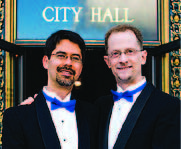 My grandparents grew up in a small village in southern China, and raised my mother and her siblings in Hawaii. My grandparents might have thought of themselves as very open-minded about marriage when they told my mother she did not have to have an arranged marriage—all they asked was that she marry a man who spoke their same village dialect of Cantonese. But my mother had ideas of her own, and she looked far beyond the family village when she married my father, who is of English and Irish descent.
My grandparents grew up in a small village in southern China, and raised my mother and her siblings in Hawaii. My grandparents might have thought of themselves as very open-minded about marriage when they told my mother she did not have to have an arranged marriage—all they asked was that she marry a man who spoke their same village dialect of Cantonese. But my mother had ideas of her own, and she looked far beyond the family village when she married my father, who is of English and Irish descent.
Our family has a history of working for marriage equality, and it wasn’t until 1967 that interracial marriages like my parents’ were legal in all 50 states. Although John and I have been together over 29 years now, our marriage has been legal in all 50 states for less than a year, yet we are already looking forward to a day when our marriage will be legal in China as well.
Marriage equality activists across the U.S. used to ask for marriage licenses every year as a way to demonstrate the unfairness of marriage discrimination, and to put a human face on the issue as a way to open hearts and change minds. Ultimately, when our marriage license was taken away, we joined others and sued the government. After many ups and downs, we prevailed.
We are heartened to see how couples in China and elsewhere in Asia have adopted this strategy of asking for marriage licenses. One brave couple in Changsha, China, asked for a marriage license, and when they were turned down, they sued the government.
Sun Wenlin and Hu Mingliang filed the first lawsuit in China for equal marriage rights. When they arrived at their hearing before Changsha Furong People’s Court, they were greeted by cheers from hundreds of supporters waving rainbow flags. Although they lost the first legal round this past week, their case has generated tremendous public interest and support, demonstrating how quickly times are changing.
As they plan their appeal, China is engaging in a national conversation about LGBT rights and marriage equality like never before. The New York Times noted that when the People’s Daily wrote and tweeted about the case, they even included a photograph of the plaintiff couple holding hands, which was a big step for the official newspaper of the Communist Party.
LGBT life is becoming increasingly visible in China, where homosexuality became legal in 1997—several years before the last sodomy laws were overturned here in the United States. Shanghai has vibrant annual Pride celebrations, PFLAG chapters are active from Guangzhou to Beijing, and rising support in opinion polls show an unmistakable trend towards equality.
In his majority Obergefell opinion for marriage equality, Justice Anthony Kennedy wrote, “Confucius taught that marriage lies at the foundation of government.” This led to a nationwide social media conversation in China last year, and prompted one Chinese scholar to say that he thinks “the ruling will have a big impact on China and may promote the legalization of same-sex marriage in China.” Although my grandparents did not live to see this day, I hope they would have been proud.
Stuart Gaffney and his husband John Lewis were plaintiffs in the California case for equal marriage rights decided by the California Supreme Court in 2008. Their leadership in the nationwide grassroots organization Marriage Equality USA contributed to making same-sex marriage legal nationwide, which happened in 2015.
Recent Comments